
2024-2025
June 2025: The school year is almost over, MASC! This summer, let’s find ways to stay sustainable while having tons of fun too! Check out the June 2025 Green Goals for ways to enjoy your summer and keep the planet in mind.
1. Go Hiking or Camping – Camping and hiking are classic summer activities that can be very eco-friendly with the right approach. Follow “Leave No Trace” principles: pack out all your trash, stick to marked trails, and respect wildlife. Use eco-friendly gear like solar-powered lights, and choose campsites and trails close to home to reduce travel emissions.
2. Host a Summer Swap – Host a summer swap event with friends, neighbors, or your community. Trade books, clothes, games, or summer gear. This reduces the demand for new items, cuts down on waste, and encourages reusing instead of buying. It’s a fun way to refresh your summer wardrobe and find some cool summer gear without spending money or harming the planet.
3. More Sustainable Travel – When you’re heading to fun summer destinations, try biking or walking instead of driving. This reduces your carbon emissions, saves you money on gas, lets you experience the outdoors, and is a great way to get exercise. If you’re traveling somewhere a bit farther away this summer, try carpooling with friends or using the metro or light rail. Do some research and see if your travel destination has free or low-cost public transit.
4. Grow a Garden – This summer, take some time to grow a garden. By growing your own fruits and vegetables, you get a healthier and more sustainable food option in your backyard. Alternatively, start a pollinator garden to help pollinators like bees and butterflies. You could even start a community garden with the help of friends or neighbors.
5. Organize a Cleanup – There’s no better time to work on beautifying your community than in the summer. Organizing local cleanups helps protect us and our waterways, ecosystem, and land. A local cleanup also gives you time to get outside and work with friends or family. Plus, it doesn’t need to be super complex—it can be as simple as picking up trash when you walk your dog.
Saan Rhyne & Vibha Nanduri, MASC Environmental Affairs Coordinators 2024-2025
May 2025: May is the perfect time to take initiative and grow plants, flowers, and all things green! As flowers burst into full bloom, make sure to choose actions that support the environment and contribute to a healthier planet. Whether it’s adding plants to your home or garden, choosing eco-friendly products, or reducing your carbon footprint, there are many ways to plant the seeds for a greener future this month. This month, let’s care for and nurture our planet just as we would a garden.
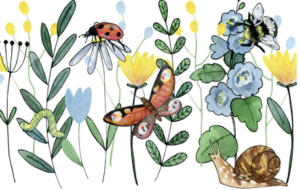 Plant a Pollinator Garden – Did you know that many of our favorite plants rely on pollinators like bees, birds, and butterflies to grow? This May, consider planting a pollinator-friendly garden! Choose plants like lavender, milkweed, and echinacea that support local wildlife. Not only will your garden thrive, you’ll also be helping to create a habitat that benefits local ecosystems.
Plant a Pollinator Garden – Did you know that many of our favorite plants rely on pollinators like bees, birds, and butterflies to grow? This May, consider planting a pollinator-friendly garden! Choose plants like lavender, milkweed, and echinacea that support local wildlife. Not only will your garden thrive, you’ll also be helping to create a habitat that benefits local ecosystems.
Houseplants – There’s no better way to embrace plants and greenery in your daily routine than to get a houseplant. From small succulents to flowering plants and leafy ferns, houseplants are excellent pieces of decor that brighten a room and go well in any space. In addition to their aesthetic capabilities, houseplants can help boost air quality indoors.
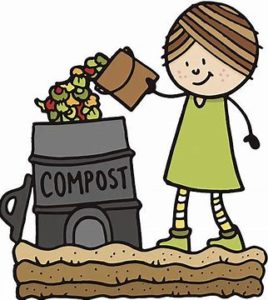 Eco-Friendly Gardening – May is an excellent month to start a new garden or enhance an existing one. Try composting, and turn your food scraps into rich soil for your garden. Use organic fertilizers that are better for your plants and the environment, and avoid chemical pesticides that can harm wildlife. Consider setting up a rainwater collection system to water your garden, conserve water, and reduce your water bill!
Eco-Friendly Gardening – May is an excellent month to start a new garden or enhance an existing one. Try composting, and turn your food scraps into rich soil for your garden. Use organic fertilizers that are better for your plants and the environment, and avoid chemical pesticides that can harm wildlife. Consider setting up a rainwater collection system to water your garden, conserve water, and reduce your water bill!
Sustainable Plant Purchasing – When buying a plant, it’s important to consider where the plant is from, on both a local and a broader level. Buying locally-grown native plants supports your local economy and ecosystem, and reduces shipping costs (both economically and ecologically). Local garden centers are a great resource for sustainable options, and you’ll be able to choose plants well-suited to your climate.
April 2025: April is a month of renewal, with flowers blooming, longer days, and the celebration of Earth Day—a perfect time to embrace the environment! As we enjoy the beauty of spring, let’s also think about how we can care for the planet. From cutting down on waste to making eco-friendly choices in our daily lives, small actions can make a big impact. This April, let’s welcome the season of growth with a commitment to greener habits.
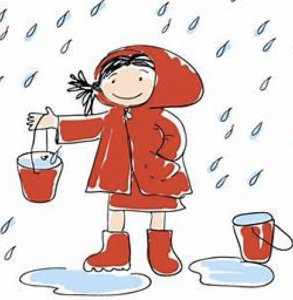 Rainwater Collection – With spring showers on the way, rainwater collection is a simple, sustainable way to reduce reliance on household water. Capturing water in a rain barrel allows you to reuse it for gardening, cleaning, or even drinking with proper filtration. It also helps minimize stormwater runoff and pollution, benefiting both your home and the environment!
Rainwater Collection – With spring showers on the way, rainwater collection is a simple, sustainable way to reduce reliance on household water. Capturing water in a rain barrel allows you to reuse it for gardening, cleaning, or even drinking with proper filtration. It also helps minimize stormwater runoff and pollution, benefiting both your home and the environment!
Green Challenges – Implementing small, eco-friendly challenges in your daily routine can make a big impact on the planet while helping you build sustainable habits! If you love shopping, try a “No New Clothes” Challenge for a month—this reduces demand for new clothing and encourages you to make the most of what you already own. Another idea is the “Give It Up” Challenge, where you commit to eliminating one unsustainable habit, like using single-use cups, ordering excessive takeout, or relying on plastic utensils. Small changes add up!
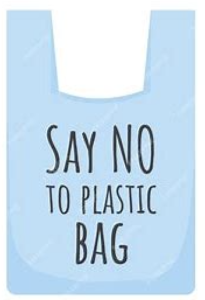 Reusable Bags– Reusable bags or totes are a simple yet powerful way to cut plastic waste and reduce your environmental impact! Single-use plastic bags take centuries to break down and often pollute oceans, harming wildlife. A durable bag/tote is a smart investment for groceries, lunches, and everyday essentials.
Reusable Bags– Reusable bags or totes are a simple yet powerful way to cut plastic waste and reduce your environmental impact! Single-use plastic bags take centuries to break down and often pollute oceans, harming wildlife. A durable bag/tote is a smart investment for groceries, lunches, and everyday essentials.
Zero Waste Lunches– Packing a zero-waste lunch is an easy way to reduce plastic waste. Use stainless steel, glass, or BPA-free containers instead of disposable bags. Bring a reusable water bottle, avoid individually packaged snacks, and switch to beeswax wraps instead of plastic wrap.
 Celebrate Earth Day- This year, over 1 billion people will celebrate Earth Day on April 22nd. It’s the perfect time to reflect on our impact and take action for the planet. Get involved by joining a cleanup, attending an Earth Day festival, choosing greener transportation, and spreading awareness to friends and family about the importance of Earth Day!
Celebrate Earth Day- This year, over 1 billion people will celebrate Earth Day on April 22nd. It’s the perfect time to reflect on our impact and take action for the planet. Get involved by joining a cleanup, attending an Earth Day festival, choosing greener transportation, and spreading awareness to friends and family about the importance of Earth Day!
March 2025: March brings the festive spirit of St. Patrick’s Day, a time to celebrate luck, starting the spring season, and all things green! While we enjoy the holiday, let’s also think about how we can celebrate in a way that’s kind to the Earth. Sometimes these festivities can involve single-use decorations and waste, but we can reduce this impact by choosing eco-friendly options, reusing materials, and opting for sustainable practices. This March, let’s balance the fun of the holiday with a commitment to greener choices!
Green Cleaning – Switch to all-natural cleaning alternatives instead of harsh chemical cleaners, especially during the spring cleaning season. A great way to start is by making an all-purpose cleaner using simple household ingredients like vinegar, baking soda, and lemon juice which can effectively remove dirt and disinfect surfaces without releasing harmful toxins into the air. Instead of relying on disposable paper towels, try using reusable cloths or repurposed t-shirts to clean up spills and wipe down surfaces. When doing laundry, choose an eco-friendly detergent that is biodegradable and free from harmful chemicals.
Avoid Harmful Cosmetics – Many personal care products contain ingredients that are not only harmful to your skin but also damaging to the environment. Take the time to carefully check the ingredient lists on your skincare, makeup, & hair care products, and make a conscious effort to avoid those that contain parabens, phthalates, sulfates, and microplastic. If you use disposable makeup wipes regularly, consider switching to reusable alternatives such as washable cotton rounds or soft microfiber cloths, which can be easily cleaned and used repeatedly. For an even more sustainable approach to self-care, try incorporating natural beauty remedies into your routine (click here for tips on natural ingredients).
Healthy and Natural Eating – Make an effort to buy fresh, local, and organic foods whenever possible! Instead of relying on heavily processed and packaged foods that are often filled with preservatives and artificial additives, try preparing more meals at home using whole ingredients, which will not only be healthier but also help you cut down on unnecessary plastic waste. Challenge yourself to try at least one new plant-based meal each week, as eating more fruits, vegetables, and legumes is both healthier and better for the environment.
Double Green Decorations – With St. Patrick’s Day and the arrival of spring, your decorations may be green in color, but consider keeping them truly “green” by making eco-friendly choices. Instead of buying plastic decorations, reuse decorations from previous years or make DIY crafts from recycled materials. For a festive and eco-friendly touch, decorate with potted plants or fresh flowers instead of artificial ones!
Item Swap – Host an item swap with your friends and family, where everyone can trade gently used items like school supplies, accessories, or clothing. It’s a sustainable way to declutter and refresh your belongings without buying new ones. This swap reduces waste, encourages sharing, and offers a thoughtful way to show you care through personalized items.
February 2025: Valentine’s Day is one of the most popular holidays celebrated worldwide! For many people, it’s a time of celebrating love and showing appreciation for special people in our lives. Let’s share this love with the Earth too! Unfortunately, Valentine’s Day can have some negative effects on our planet, but we can learn to mitigate this harm by lowering the number of items we use and consume, along with finding more ecological ways to celebrate Valentine’s Day. By doing this, we can balance fun and awareness!
 Avoid Single-Use Items – One way you can work towards a more sustainable Valentine’s Day is by decreasing the amounts of single-use items we use. Items like wrapping paper and plastic packaging create large amounts of waste. Many people don’t properly dispose of these items, contributing to waste build-up in landfills where they are buried. By choosing eco-friendly wrapping such as fabrics, recyclable paper, or reusable gift bags, you can pair these with more sustainable gifts like flowers or handmade items and lower the amount of single-use items that impact the planet!
Avoid Single-Use Items – One way you can work towards a more sustainable Valentine’s Day is by decreasing the amounts of single-use items we use. Items like wrapping paper and plastic packaging create large amounts of waste. Many people don’t properly dispose of these items, contributing to waste build-up in landfills where they are buried. By choosing eco-friendly wrapping such as fabrics, recyclable paper, or reusable gift bags, you can pair these with more sustainable gifts like flowers or handmade items and lower the amount of single-use items that impact the planet!
Purchasing Flowers – Speaking of flowers, you should know from where you’re purchasing. Flowers are a popular gift, but ensuring businesses don’t use chemical fertilizers and pesticides is a good step to a greener Valentine’s Day. Also, try buying local flowers, supporting small businesses to help the local economy, and reducing pollutants and preservatives from far-away imports!
 Food Waste – Another way to celebrate a greener Valentine’s Day is by monitoring your food waste. Although it’s nice to eat out, try eating planned meals at home to reduce food waste. If you do choose to eat out, consider using eco-friendly takeout containers or bring your own containers from home for leftovers.
Food Waste – Another way to celebrate a greener Valentine’s Day is by monitoring your food waste. Although it’s nice to eat out, try eating planned meals at home to reduce food waste. If you do choose to eat out, consider using eco-friendly takeout containers or bring your own containers from home for leftovers.
Mindful Recycling – Lastly, try being more mindful of what you’re recycling and throwing in the trash. Remember paper and packed items should be recycled wherever possible. Items like reusable ribbons and bows can be saved and used too! Also, try to avoid things that contain glitter—although they are made of plastic, they are not recyclable.
 Although these things may seem frugal and unnecessary to many people, they can make a huge global difference. Encourage other people to take steps towards a more environmentally aware Valentine’s Day this February!
Although these things may seem frugal and unnecessary to many people, they can make a huge global difference. Encourage other people to take steps towards a more environmentally aware Valentine’s Day this February!
January 2025: Happy New Year, MASC! As we welcome 2025, let’s take small, meaningful steps to help protect the planet. New Year’s resolutions can sometimes feel overwhelming, making it tough to stay consistent throughout the year. That’s why we’re sharing a few simple, actionable goals you can start anytime to make a difference.
Go Digital – When sending New Year invitations or greetings (any invitations) go electronic to save paper. You can post a digital card or video message to loved ones instead of mailing paper cards. Use apps or websites like Canva, Evite, or Paperless Post to create and send cards. This significantly reduces the environmental impact of paper production, including the need to cut down trees, which contributes to deforestation. If you decide to go the physical card route, consider using recycled materials like newspapers or mail clippings creatively!
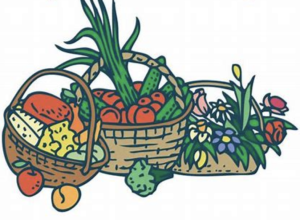 Support Local Farmers’ Markets – By supporting, you can ensure that your produce and products are locally grown and crafted, while subsequently benefitting your local ecosystem, community, and economy. Locally sourced goods also require less transportation and production often uses fewer resources compared to industrial alternatives. A list of farmers markets in Maryland, separated by county, is linked here.
Support Local Farmers’ Markets – By supporting, you can ensure that your produce and products are locally grown and crafted, while subsequently benefitting your local ecosystem, community, and economy. Locally sourced goods also require less transportation and production often uses fewer resources compared to industrial alternatives. A list of farmers markets in Maryland, separated by county, is linked here.
Use Reusable Materials – Use reusable materials! Instead of wasting your money on single-use plastics, you could benefit the environment and your wallet by opting to buy reusable materials that will last you significantly longer. Examples of reusable materials include water bottles, cloth napkins, reusable cotton rounds, and many other eco-friendly alternatives. Fewer disposables mean lower greenhouse gas emissions, energy consumption, and use of resources.
Save Energy – Taking small steps to conserve energy can go a long way in helping our planet. For instance, turning the lights off when you leave, making sure you unplug any chargers you aren’t using, and trying to reduce the excess use of water are all simple, easy habits to adopt! For more information regarding energy conservation, you can look at the Maryland Energy Administration’s (MEA) information page linked here.
 Use Public Transportation – Using public transport is another way that you can conserve our environment and reduce your carbon footprint. Many counties offer free or reduced pricing on public transport for those under 21. Learn more on the Maryland Department of Transportation website linked here.
Use Public Transportation – Using public transport is another way that you can conserve our environment and reduce your carbon footprint. Many counties offer free or reduced pricing on public transport for those under 21. Learn more on the Maryland Department of Transportation website linked here.
December 2024: Happy Holidays, MASC! This holiday season, try to spread joy while spreading sustainability! From reusing decorations, to simply turning off lights, there are tons of ways to reduce your environmental impact during the holidays. Explore this month’s Green Goals for easy tips on making your festive season more eco-friendly. Let’s celebrate a greener winter season together!
 1. Eco-Friendly Packaging – When wrapping gifts, consider sustainable options such as recycled paper, reusable fabric, or even old newspapers. Avoid single-use wrapping materials with plastic coatings or glitter, as they are not recyclable. Try using twine, dried flowers, or natural elements like pine cones to decorate your packages instead of synthetic ribbons. You can also use reusable gift bags or boxes that recipients can repurpose for other occasions. By choosing eco-friendly packaging, you reduce waste while adding a unique and thoughtful touch to your holiday gifts.
1. Eco-Friendly Packaging – When wrapping gifts, consider sustainable options such as recycled paper, reusable fabric, or even old newspapers. Avoid single-use wrapping materials with plastic coatings or glitter, as they are not recyclable. Try using twine, dried flowers, or natural elements like pine cones to decorate your packages instead of synthetic ribbons. You can also use reusable gift bags or boxes that recipients can repurpose for other occasions. By choosing eco-friendly packaging, you reduce waste while adding a unique and thoughtful touch to your holiday gifts.
2. Reuse Decorations – This holiday season, take items that you already have or find creative ways to use materials around you instead of buying new decor. Start by saving items from previous years (such as wreaths, artificial trees, and ornaments) and using them again to reduce waste. You can also try repurposing old materials like fabric scraps to create bows or garlands. Not only does this lower your environmental impact, but it’s also a cost-efficient way to add a homemade touch to your holiday celebrations.
3. Buy Second-Hand – Buy second-hand items for books, toys, clothing, and more during the holidays to give them a new life instead of contributing to waste. Thrifting is also a great way to find vintage or one-of-a-kind pieces that can add character to your celebrations. By choosing second-hand, you help reduce the demand for new products, which lowers the energy needed for production and transportation. Plus, it’s budget-friendly! You can also give back to your community by donating gently-used items to local charitable organizations.
 4. Turn Off Lights – Turning off lights during this season is a simple yet effective way to reduce energy usage. While festive lights create a joyful atmosphere, they also consume significant energy when left on for extended periods. By turning them off during the day or when everyone has gone to bed, save electricity and lower your carbon footprint. An effective way to manage this is by using a timer, which automatically turns off your lights after a set period, making it both convenient and environmentally conscious.Minimize Heater Use – To reduce energy consumption during the colder months, limit reliance on heaters by layering clothing and using warm blankets. Seal drafts around doors and windows to retain heat more effectively and consider using area rugs to insulate floors. Taking advantage of natural sunlight by opening curtains during the day can also help warm up your home. For additional savings, lower your thermostat a few degrees and use a programmable thermostat to optimize heating schedules. These small adjustments can significantly decrease your energy usage and environmental impact.
4. Turn Off Lights – Turning off lights during this season is a simple yet effective way to reduce energy usage. While festive lights create a joyful atmosphere, they also consume significant energy when left on for extended periods. By turning them off during the day or when everyone has gone to bed, save electricity and lower your carbon footprint. An effective way to manage this is by using a timer, which automatically turns off your lights after a set period, making it both convenient and environmentally conscious.Minimize Heater Use – To reduce energy consumption during the colder months, limit reliance on heaters by layering clothing and using warm blankets. Seal drafts around doors and windows to retain heat more effectively and consider using area rugs to insulate floors. Taking advantage of natural sunlight by opening curtains during the day can also help warm up your home. For additional savings, lower your thermostat a few degrees and use a programmable thermostat to optimize heating schedules. These small adjustments can significantly decrease your energy usage and environmental impact.
November 2024: This November, we encourage you to give thanks and give back with sustainable habits! From composting your Thanksgiving food scraps to shopping locally and carpooling to gatherings, there are many ways to reduce your environmental impact. Explore this month’s Green Goals for easy tips on making your holiday season more eco-friendly. Let’s celebrate a greener Thanksgiving together!
Carpooling – Carpool with friends or family when attending social events to reduce emissions. Use carpooling apps or group messaging to coordinate rides, making it easier to plan together. Rotate who drives or shares fuel costs as an incentive for participation. This practice minimizes your carbon footprint and also makes gatherings more affordable.
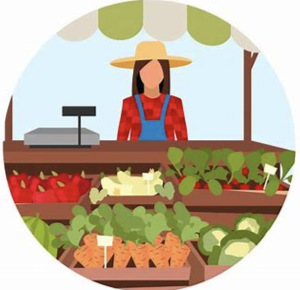 Buying Locally Sourced Food – When preparing Thanksgiving food, buy groceries from local farmers’ markets or sustainable vendors. Begin by researching local markets in your area and planning meals around seasonal produce. Try building relationships with farmers to use local ingredients regularly. Additionally, use your packaging, such as glass containers, for storing the ingredients you buy. This approach supports local economies and reduces the carbon footprint associated with long-distance food transport.
Buying Locally Sourced Food – When preparing Thanksgiving food, buy groceries from local farmers’ markets or sustainable vendors. Begin by researching local markets in your area and planning meals around seasonal produce. Try building relationships with farmers to use local ingredients regularly. Additionally, use your packaging, such as glass containers, for storing the ingredients you buy. This approach supports local economies and reduces the carbon footprint associated with long-distance food transport.
Storing and Repurposing Leftovers – Store leftovers in reusable containers and repurpose them into new meals a few times a week to minimize food waste and save money. Organize your fridge so leftovers are easily visible and accessible, making it simple to grab and use. Get creative with recipes (such as a “Thanksgiving Casserole”) that turn yesterday’s meals into fresh dishes, helping to reduce landfill waste and supporting a more sustainable approach to cooking. You can also encourage your community to bring reusable containers to gatherings to ensure no food goes wasted!
 Composting Food Scraps – Composting is essential for Thanksgiving as it reduces holiday food waste and helps enrich soil instead of adding to landfills. To reduce food waste in your household, try setting up a composting system. Start by choosing a composting method that suits your space, like a countertop bin, outdoor pile, or a tumbler. Help educate your friends and family on what can and cannot be composted. Then, regularly collect food scraps, and use the compost for your garden or donate it to a community garden.
Composting Food Scraps – Composting is essential for Thanksgiving as it reduces holiday food waste and helps enrich soil instead of adding to landfills. To reduce food waste in your household, try setting up a composting system. Start by choosing a composting method that suits your space, like a countertop bin, outdoor pile, or a tumbler. Help educate your friends and family on what can and cannot be composted. Then, regularly collect food scraps, and use the compost for your garden or donate it to a community garden.
Sustainable Outdoor Activities – This Thanksgiving, choose outdoor activities, such as hiking or biking to enjoy nature sustainably. By using non-motorized options, you will help reduce pollution and conserve resources. You can also participate in local environmental initiatives such as trail maintenance or tree planting, which provide a meaningful way to give back to the community while spending time outdoors. These activities are a great way to connect with family and friends during the holiday season!
October 2024: It’s Spooky Season, MASC! Embrace a green Halloween and celebrate in an eco-friendly way. Reduce your environmental footprint and inspire others to do the same. From DIY costumes to composting your pumpkins, discover how to make your October spooky and sustainable. For sustainable tricks (and treats), check out this month’s Green Goals and join us in making a positive impact this Halloween!
1. DIY or Thrift Costumes – Creating or thrifting your costume is a great way to stay green. Fast fashion contributes heavily to waste and pollution, so repurposing clothes you already have or shopping second-hand reduces that impact. Get creative by combining old clothes, fabric scraps, or even repurposed household items. Thrift stores can inspire fresh, inventive costumes while keeping your budget and the planet happy.
 2. Eco-Friendly Decor – This Halloween, skip the plastic decor and embrace natural, reusable, or upcycled options. Make spooky centerpieces from leaves and twigs, create lanterns from glass jars, and use what you already have in the house. You can also buy reusable Halloween decorations that last for years. Biodegradable decorations made from paper or fabric are also eco-friendly. When Halloween is over, these items can be composted, helping to reduce landfill waste.
2. Eco-Friendly Decor – This Halloween, skip the plastic decor and embrace natural, reusable, or upcycled options. Make spooky centerpieces from leaves and twigs, create lanterns from glass jars, and use what you already have in the house. You can also buy reusable Halloween decorations that last for years. Biodegradable decorations made from paper or fabric are also eco-friendly. When Halloween is over, these items can be composted, helping to reduce landfill waste.
3. Sustainable Trick-or-Treating – Use reusable bags, baskets, or pillowcases for collecting candy instead of plastic bags or buckets. You can also reduce waste by offering treats with more eco-friendly packaging, like candies wrapped in foil or paper. Another option is to hand out small, non-candy items such as pencils, stickers, or toys, which are more likely to be reused, and less likely to end up in the landfill. These alternatives reduce waste while still keeping Halloween fun for kids. Encourage neighbors to join in for an even greater impact!
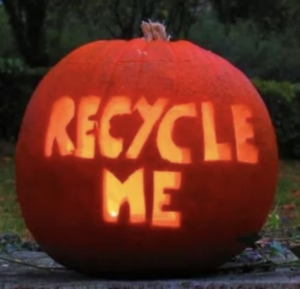 4. Compost Your Pumpkins – After Halloween, compost your pumpkins instead of tossing them in the trash. Organic matter like pumpkins breaks down easily in a compost pile, providing nutrients to the soil. If you don’t have a compost bin, many communities offer pumpkin drop-off points for composting. This simple step reduces food waste in landfills and can help bring some life to your grass or garden.
4. Compost Your Pumpkins – After Halloween, compost your pumpkins instead of tossing them in the trash. Organic matter like pumpkins breaks down easily in a compost pile, providing nutrients to the soil. If you don’t have a compost bin, many communities offer pumpkin drop-off points for composting. This simple step reduces food waste in landfills and can help bring some life to your grass or garden.
5. Green Halloween Parties – When hosting a Halloween party, opt for sustainable practices to make your celebration both fun and eco-friendly. Use reusable tableware, such as cloth napkins and ceramic plates, instead of disposable items. Decorate with upcycled or natural materials, like fall leaves and pumpkins. Offer locally sourced or organic snacks and drinks, and choose eco-friendly party favors like spooky plants or homemade treats. Encourage guests to bring reusable containers for leftovers, and consider digital invitations to reduce paper waste.
September 2024: Welcome back-to-school, MASC! This school year, make sustainability a priority and mitigate your impact on our environment. By incorporating eco-friendly practices into your school routines, you can protect the planet and create valuable learning opportunities for yourself and your peers that are an essential part of education. To learn more about back-to-school sustainability, check out this month’s Green Goals below!
1. Purchase Eco-Friendly School Supplies – When purchasing new school supplies, opt for products with minimal packaging or ones that are made from recycled materials. However, it’s always best to use what you have. If you have pencils that are leftover from last year, use them! You can also reuse folders, binders, and even notebooks from previous years to be more eco-friendly.
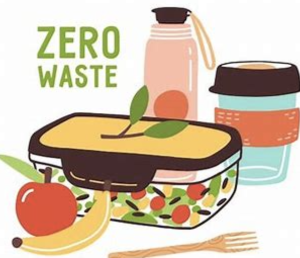 2. Waste-Free Lunches – If you pack your lunch, try to use reusable lunch boxes and water bottles instead of disposable ones. This reduces waste and prevents more plastic from ending up in landfills. It normally ends up being more cost-efficient over time too! Purchasing and using reusable food storage containers instead of using single-use Ziploc-type bags also reduces waste, and can also be more cost-effective.
2. Waste-Free Lunches – If you pack your lunch, try to use reusable lunch boxes and water bottles instead of disposable ones. This reduces waste and prevents more plastic from ending up in landfills. It normally ends up being more cost-efficient over time too! Purchasing and using reusable food storage containers instead of using single-use Ziploc-type bags also reduces waste, and can also be more cost-effective.
3. Using Sustainable Transportation – There are several eco-friendly options for traveling to school and beyond. Walking and biking not only reduce your carbon footprint but also promote physical health and well-being. Carpooling and public transportation, such as school buses, are great ways to minimize emissions and costs by sharing rides. Additionally, electric and hybrid vehicles offer cleaner alternatives to traditional gas vehicles, and many school districts are adopting electric school buses to further decrease environmental impact.
4. Reduce Energy Waste – For effective lighting, maximize natural light by keeping blinds open during daylight hours. Try switching to energy-efficient LED bulbs and installing motion sensors to reduce unnecessary energy usage. You can make it a routine to turn off lights and unplug devices when they’re not in use, preventing wasted energy and reducing electricity costs. You can also use programmable thermostats to manage heating and cooling according to your schedule.
 5. Environmental Clubs – If you are looking for a community of like-minded environmental advocates, consider joining an environmental club or team. These groups often organize events, clean-ups, and campaigns to drive collective action for protecting the environment. Many of these clubs explore environmental challenges and develop a creative approach to solving pressing environmental issues. You can also start your own!
5. Environmental Clubs – If you are looking for a community of like-minded environmental advocates, consider joining an environmental club or team. These groups often organize events, clean-ups, and campaigns to drive collective action for protecting the environment. Many of these clubs explore environmental challenges and develop a creative approach to solving pressing environmental issues. You can also start your own!
August 2024: The summer is always packed with fun, games, and excitement. As you enjoy your summer, here are some top ways that you can stay sustainable while having fun.
1. Explore Local Farmers Markets – The summer is the peak season for farmers’ markets. These markets support local farmers and sustainably grown produce. Food grown at smaller, local farms is less likely to have harmful, toxic pesticides and artificial fertilizers used in the growing process. In addition, local produce doesn’t have to travel nearly as far, which means it’s fresher and produces less greenhouse gas emissions from transport.
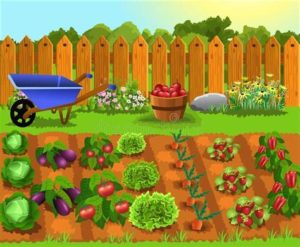 2. Garden – Similar to food at farmers’ markets, produce and herbs grown in your backyard are superbly sustainable. When you grow your food, you reduce your carbon footprint and avoid harmful chemicals and pesticides that corporate farms use. Plus, you don’t have to garden alone! Starting a community garden is a great bonding activity for your neighborhood or community. You can even purchase a greenhouse cover to keep it going past summer!
2. Garden – Similar to food at farmers’ markets, produce and herbs grown in your backyard are superbly sustainable. When you grow your food, you reduce your carbon footprint and avoid harmful chemicals and pesticides that corporate farms use. Plus, you don’t have to garden alone! Starting a community garden is a great bonding activity for your neighborhood or community. You can even purchase a greenhouse cover to keep it going past summer!
3. Participate in a Local Cleanup – Participating in a neighborhood, park, stream, or beach cleanup is a great way to help protect our local waterways, land, and ecosystem. It also gives you time to get outside and hang out with friends and family. It can be as simple as picking up any trash you see while walking your dog or as organized as getting your whole neighborhood involved.
 4. Bike or Walk Instead of Driving – Instead of driving to nearby summer destinations, consider biking or walking. These modes of transportation produce no emissions, are great forms of exercise, and are fun. You can explore local trails, parks, or scenery, all while reducing your carbon footprint and promoting a healthy lifestyle for you and your friends/family.
4. Bike or Walk Instead of Driving – Instead of driving to nearby summer destinations, consider biking or walking. These modes of transportation produce no emissions, are great forms of exercise, and are fun. You can explore local trails, parks, or scenery, all while reducing your carbon footprint and promoting a healthy lifestyle for you and your friends/family.
5. Host an Eco-Friendly Picnic – Organize a picnic with your friends and family using sustainable practices. Choose a local park, beach, or your backyard, and bring reusable utensils, plates, bowls, and napkins. Bring locally sourced foods (perhaps from a local farmers market, or your garden!) and beverages. Avoid single-use plastics and strive to use biodegradable or reusable items. You’ll enjoy a great meal outdoors, and will also minimize waste and support environmentally friendly practices.
 Maryland Association
Maryland Association



















